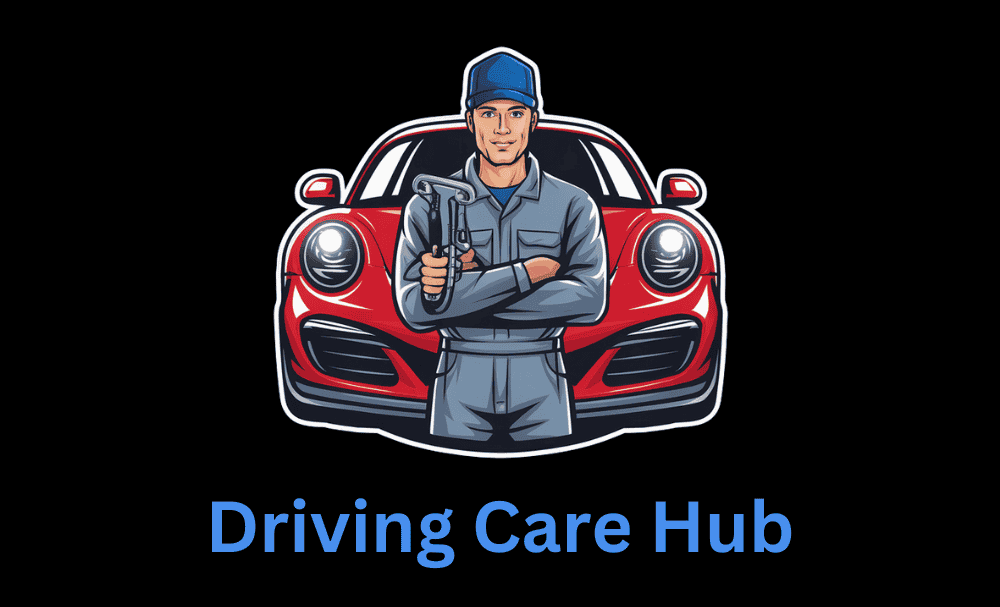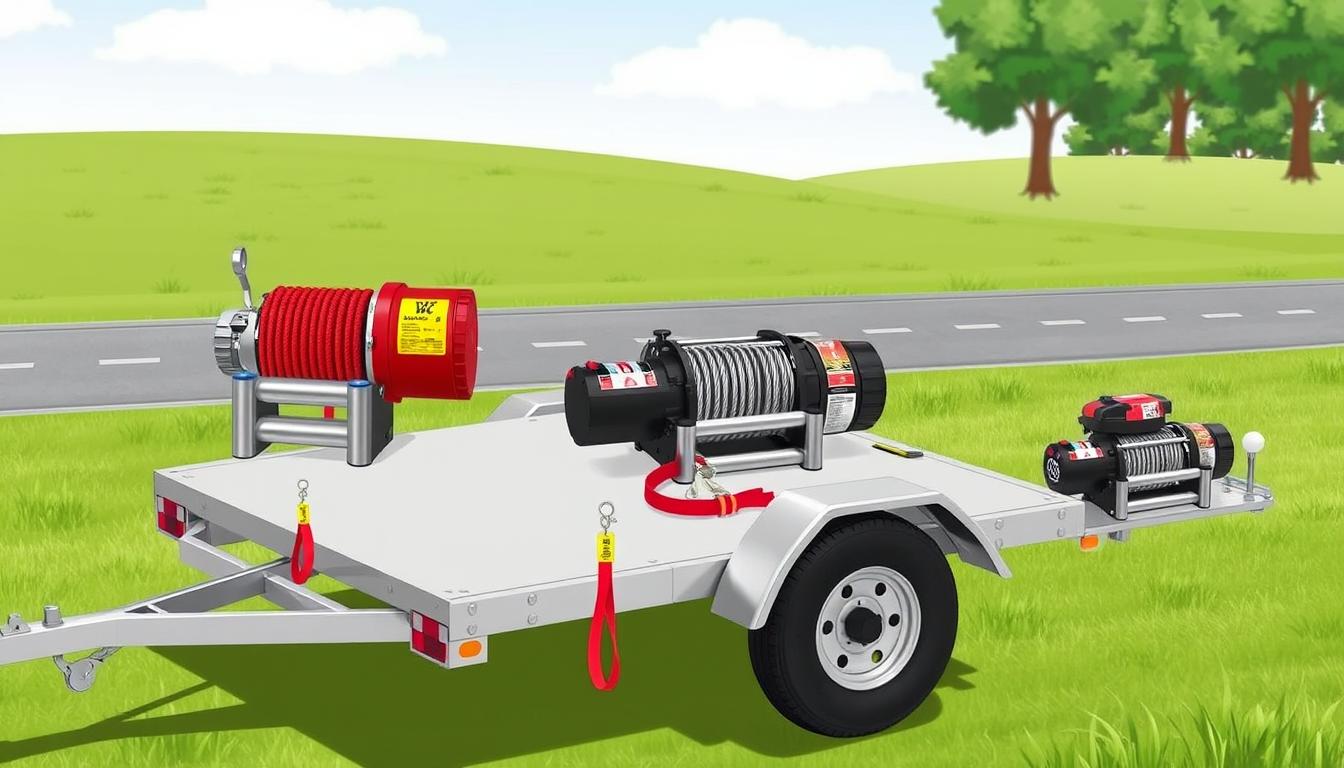Choosing the right winch for your car trailer is key for safe and easy loading. The size you need depends on your trailer’s capacity, your vehicle’s weight, and the winch cable length. This guide will help you understand what to look for when buying a winch.
Winches between 2,500 to 6,000 pounds work well for most car hauling tasks. They’re good for vehicles around 3,000 pounds. Remember, heavier loads need stronger winches. Knowing your load needs is crucial for a smooth experience.
Let’s explore the world of winches. We’ll talk about different types, setups, and features that boost performance.
Key Takeaways
- Understanding the right winch size is vital for load efficiency and safety.
- Winches between 2,500 to 6,000 pounds meet most car hauling needs.
- The winch capacity should match your vehicle’s Gross Vehicle Weight.
- Electric winches are more efficient than manual ones.
- Using extra gear like snatch blocks can increase pulling power.
Understanding Winch Capacity and Car Trailers
Winch capacity is key when picking a winch for your car trailer. It ensures vehicles are moved safely and efficiently. Knowing the right winch for your needs is vital for safe operation.
What is Winch Capacity?
Winch capacity is the max weight a winch can lift. It includes both dynamic and static ratings. This helps you pick a winch that meets your towing needs.
For example, if you’re towing a 3,000-pound vehicle, you need a winch that can handle more. This ensures safety and reliability.
How is Winch Capacity Measured?
Winch weight ratings are found through several methods. The 1.5x rule is common. It says to double the heaviest object’s weight to find the right winch size.
This rule helps account for different terrains, load weights, and weather. It’s important for the winch to work well in various conditions.
Importance of Winch Capacity for Trailers
Winch capacity is very important for trailers. Using a winch that’s too small can cause it to fail. This can be dangerous.
For the best results, trailers have winches with different capacities. These range from small loads on ATVs to big loads on trucks for off-roading.
Types of Winches Suitable for Car Trailers
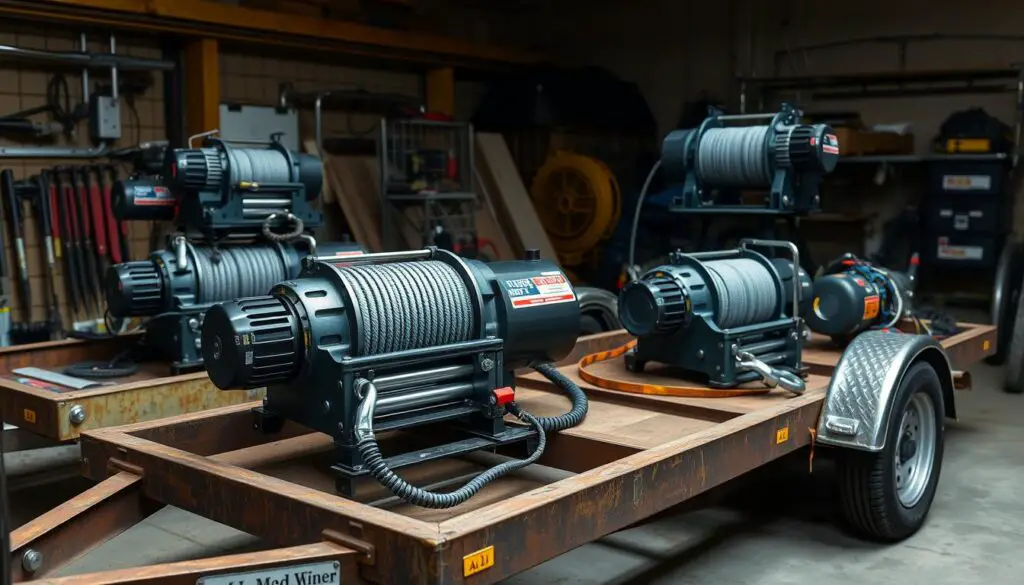
Choosing the right winch means knowing the differences between types. Electric winches are popular for their ease of use. Hydraulic winches are best for heavy-duty tasks.
Think about what you need to decide. This will help you pick the best winch, including how to mount it.
Electric Winches vs. Hydraulic Winches
Electric winches use AC or DC power. Most trailer winches need a 12-volt DC connection. They are easy to install and use.
They work well for most SUVs, trucks, and Jeeps. Winches in the 9,000 to 12,000-pound range are best.
Hydraulic winches perform better in tough conditions. They don’t need electricity and can lift heavy loads. They’re great for big trucks and off-road adventures, with winches from 15,000 to 18,000 pounds.
Manual Winches: Pros and Cons
Manual winches have their own benefits and drawbacks. They cost less than electric and hydraulic winches. But, they require a lot of effort to use.
They’re good for lighter tasks or when you’re watching your budget. They work well for ATVs and small trailers, with pull capacities of 4,500 to 5,000 pounds.
When picking a winch for your car trailer, consider these points. Your choice will depend on your needs and the weight you’ll be towing.
Key Factors in Selecting the Right Winch Size
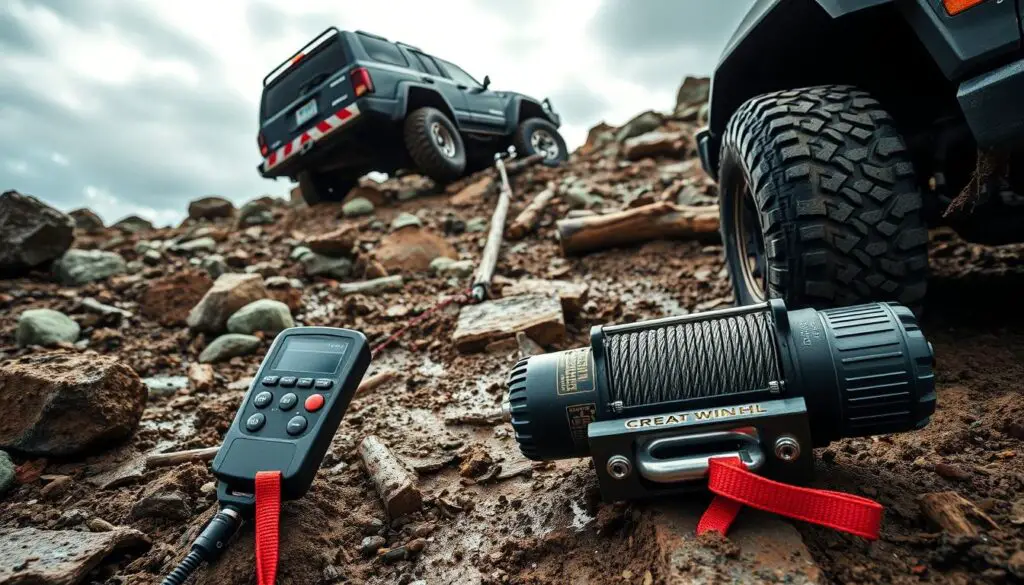
Choosing the right winch size for your car trailer is important. You need to think about the trailer’s weight and the terrain. These factors help pick the best winch weight rating for safe and efficient use.
Weight of the Car Trailer
The weight of the car and trailer matters a lot. You must know the total weight to pick the right winch. A winch that’s too small can fail or cause accidents.
Check the trailer and vehicle specs to find a winch with enough pull power.
Terrain Considerations
The terrain affects the winch’s performance. Steep hills, uneven ground, or mud need a stronger winch. A winch remote control is handy for safe use in tough spots.
Think about the surface and traction when picking a winch. This ensures safety and efficiency.
Determining the Load Capacity Needed
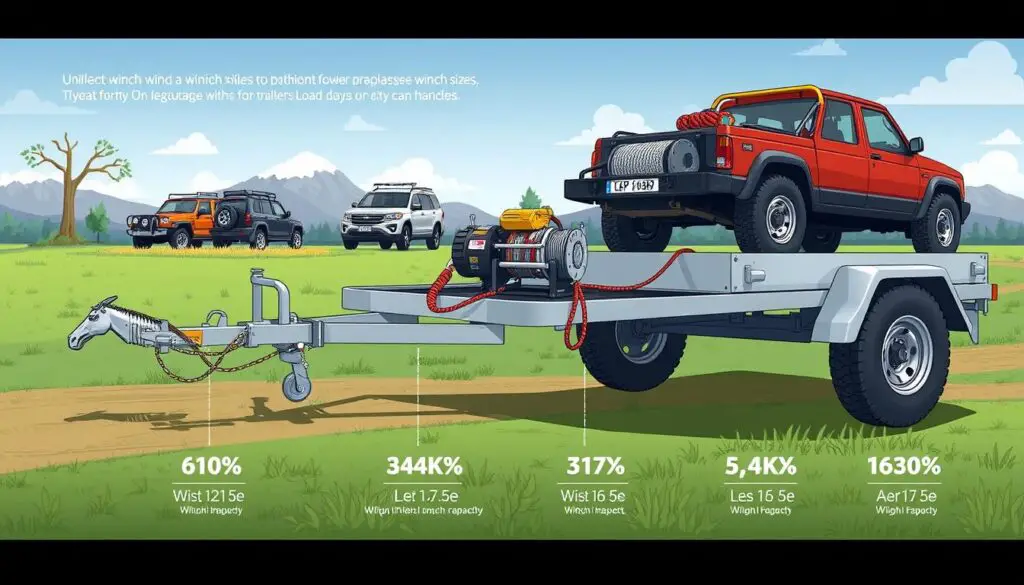
It’s key to know the right winch load capacity for safe use. A good rule is to pick a winch that can handle at least 1.5 times the vehicle’s weight. This load capacity rule keeps the winch from getting too much stress. It helps the winch last longer and work better.
Rule of Thumb for Load Capacity
To figure out the winch load capacity, start with the vehicle’s Gross Vehicle Weight Rating (GVWR). For instance, if the GVWR is 4,000 lbs, get a winch that can handle 6,000 lbs (4,000 lbs x 1.5). SUVs, trucks, and Jeeps usually need winches between 9,000 to 12,000 lbs. Big trucks might need winches up to 18,000 lbs for tough off-roading. Smaller vehicles like ATVs and UTVs might only need winches up to 5,000 lbs.
Safety Margins to Consider
Adding winch safety features to your choice is important for safe use. Also, think about the terrain, load, weather, and winching angles. Using tools like snatch blocks can double the lifting power. This makes recovery safer by giving more leverage. Choosing a bigger winch usually means better performance and less overheating in tough spots.
Features to Look for in a Car Trailer Winch
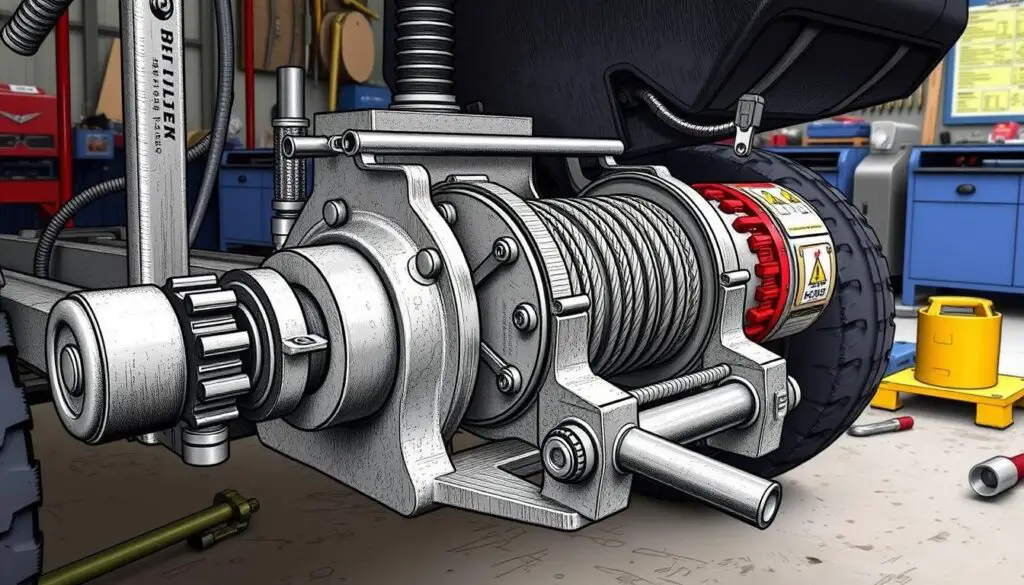
Choosing the right winch for your car trailer is key. Look for features that boost efficiency and safety. Line speed and power are important for how well the winch works. The braking system is also crucial for safety.
Line Speed and Power
Line speed shows how fast the winch can pull a car onto the trailer. Faster line speeds mean quicker loading and unloading. For example, the VEVOR Electric Winch can pull 13,000 lbs fast.
Winch power is also vital. It shows how well the winch can handle different weights. Knowing what you need helps pick the right winch.
Brake Systems for Safety
The braking system is key for managing loads safely. It stops the load from falling, keeping everyone safe. Wheel brakes or automatic systems add extra safety, important for heavy loads.
Getting a winch with a good braking system cuts down on accidents. It’s a smart investment for safety.
Accessories to Enhance Winch Performance
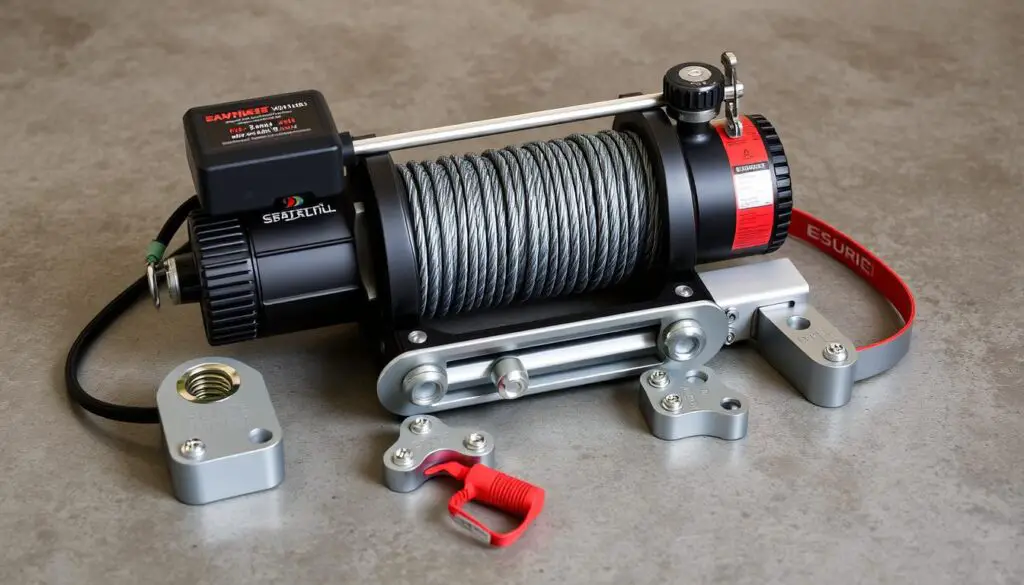
A winch is more than just a tool. It can be made better with the right accessories. Things like a good winch controller, snatch blocks, and fairleads can make your winch work better. Let’s look at these accessories closer.
Winch Controller Options
Choosing the right winch controller is key. It affects how easy it is to use and how safe it is. You can pick from wired or wireless controllers.
Wired controllers give a strong signal without any problems. Wireless ones let you control the winch from a distance. This makes using the winch safer and easier.
Snatch Blocks and Fairleads
Snatch blocks are great for any winch setup. They let you double the lifting power when needed. They also change the direction of the pull.
Fairleads are important too. They guide the winch cable and help it last longer. With the right fairleads, your winch line stays strong and works better.
| Accessory | Function | Benefits |
|---|---|---|
| Winch Controller | Controls the winch operation | Improves convenience and safety |
| Snatch Block | Changes direction and increases lifting power | Enhances pulling capacity and efficiency |
| Fairlead | Guides the winch cable | Reduces wear and tear on the winch line |
Common Mistakes When Choosing a Winch
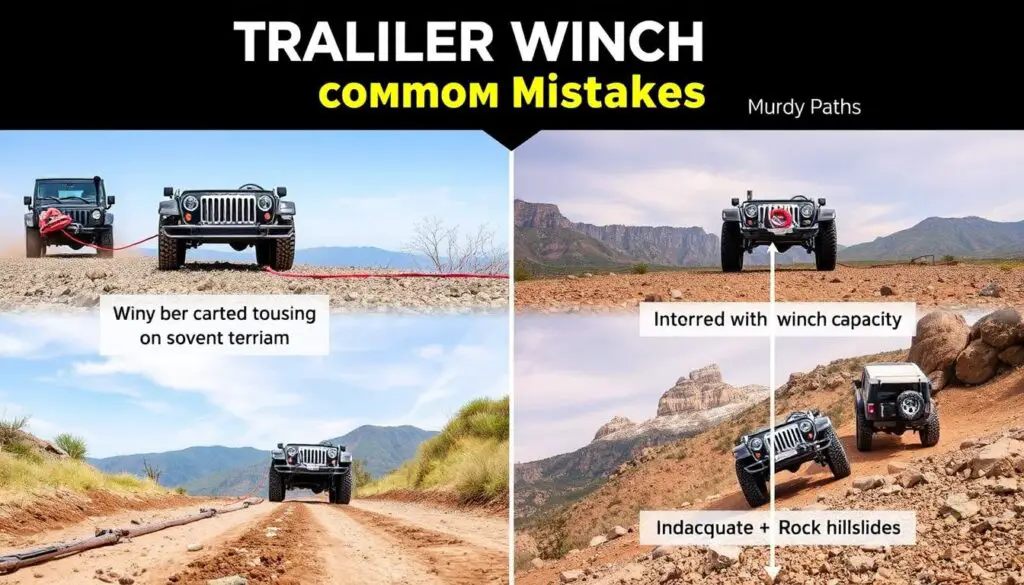
Choosing the right winch can be hard. Many people make mistakes that cause problems later. Knowing about winch capacity, mounting options, and terrain challenges helps a lot.
Overestimating Winch Capacity
One big mistake is thinking you need a winch that’s too big. This can cost more money and use more power. A winch that’s too strong can also get too hot and use a lot of power.
New winches work well at high pulls. But, they still get hot and use a lot of power if used at their max all the time.
Ignoring Terrain Challenges
Not thinking about the terrain is another big mistake. Different places need different winches. Make sure your winch fits the terrain and mounting options.
If you don’t think about this, your winch might not work well. It could even damage your vehicle. Things like snatch blocks can help a lot. They make pulling easier and use less energy.
| Mistake | Impact | Prevention |
|---|---|---|
| Overestimating winch capacity | Higher costs and lower efficiency | Calculate actual required capacity accurately |
| Ignoring terrain challenges | Inefficient operations and possible damage | Assess terrain before selecting the winch |
By avoiding these mistakes, you can make a good choice when buying a winch. Make sure it fits your needs and the job you’re doing. This way, you’ll have success every time.
Maintenance Tips for Your Winch
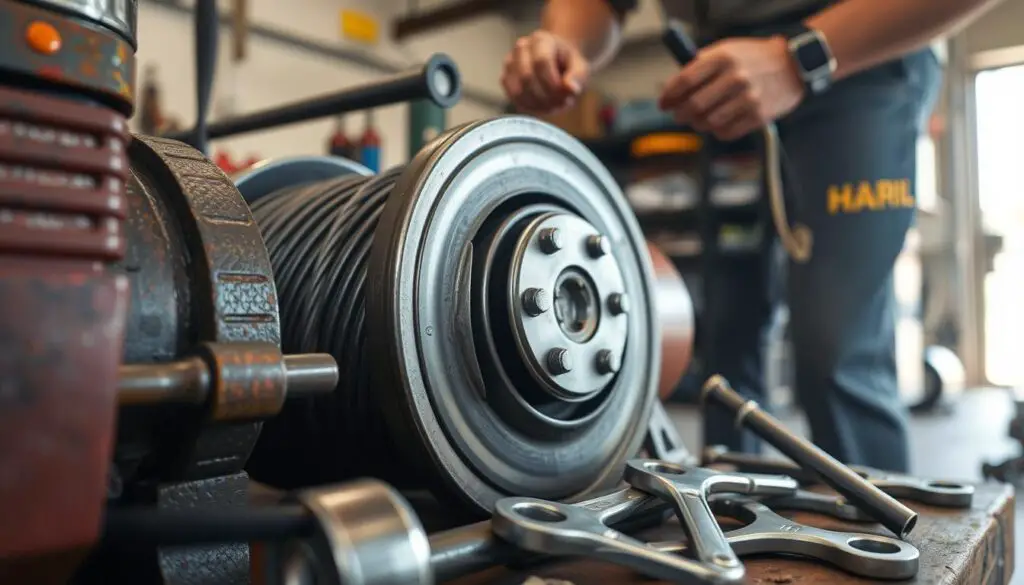
Keeping your winch in good shape is key for reliable use. Regular checks and cleanings are important. They help spot problems early and extend your winch’s life.
Regular Inspection Checklist
Here’s what to check during a winch inspection:
- Cable wear: Look for frays, kinks, or corrosion on the cable or rope.
- Electrical connections: Make sure wiring is tight and not damaged.
- Mechanical components: Check gears and bearings for wear and listen for odd noises.
- Brake system: Test the brakes to make sure they work right.
How to Clean and Lubricate
Cleaning your winch is crucial to keep it working well. Here’s how to clean and lubricate it:
- Clean the winch: Use a soft brush and mild soap to clean the winch. Rinse well and dry it.
- Inspect for rust: Check for rust on metal parts and treat it if you find any.
- Lubricate components: Use the right lubricant on moving parts, like gears and the drum.
- Store properly: Keep the winch dry when not in use to avoid rust.
Conclusion: Making an Informed Decision
As we finish this winch purchase guide, it’s important to think about what matters most. Choosing the right winch for your car trailer is key. You need to know the winch’s capacity to handle your load safely.
The size and type of your trailer also play a big role. Open, enclosed, and flatbed trailers have different needs. You should pick one that fits your specific requirements.
Recap of Key Considerations
Remember, trailer weight, size, and security are crucial. Look for features like lockable doors and alarms for valuable vehicles. Also, make sure your trailer and towing vehicle are compatible.
Don’t forget about winch safety features for a smooth tow. Doing your homework and reading reviews will help you choose wisely. This way, you’ll find a winch that fits your budget and needs.
Next Steps for Purchase
Now, start looking for winch models and brands that match your needs. Check the warranties and support from manufacturers. This will give you confidence in your purchase.
Don’t forget about maintenance and customization. These can make your trailer more efficient. With the knowledge you’ve gained, you’re ready to make a smart choice for your car hauling needs.
FAQ
What size winch do I need for my car trailer?
How do I determine the trailer winch capacity?
What is the difference between electric and hydraulic winches for car trailers?
How important is winch cable length?
What safety features should I look for in a winch?
Can snatch blocks actually improve my winch’s lifting capacity?
What maintenance is required for my winch?
What are common mistakes when choosing a winch?
How do I safely operate a winch on uneven terrain?
What accessories can enhance the performance of my winch?

Jack Thompson is a writer and seasoned auto mechanic with over 15 years of experience in the automotive industry. Known for his expertise in vehicle mechanics, Jack has a deep understanding of car and truck systems. His skills, honed through years of hands-on experience, have made him a trusted name in the field. Jack is committed to providing valuable insights into car maintenance and repair, helping vehicle owners keep their vehicles in top condition.
